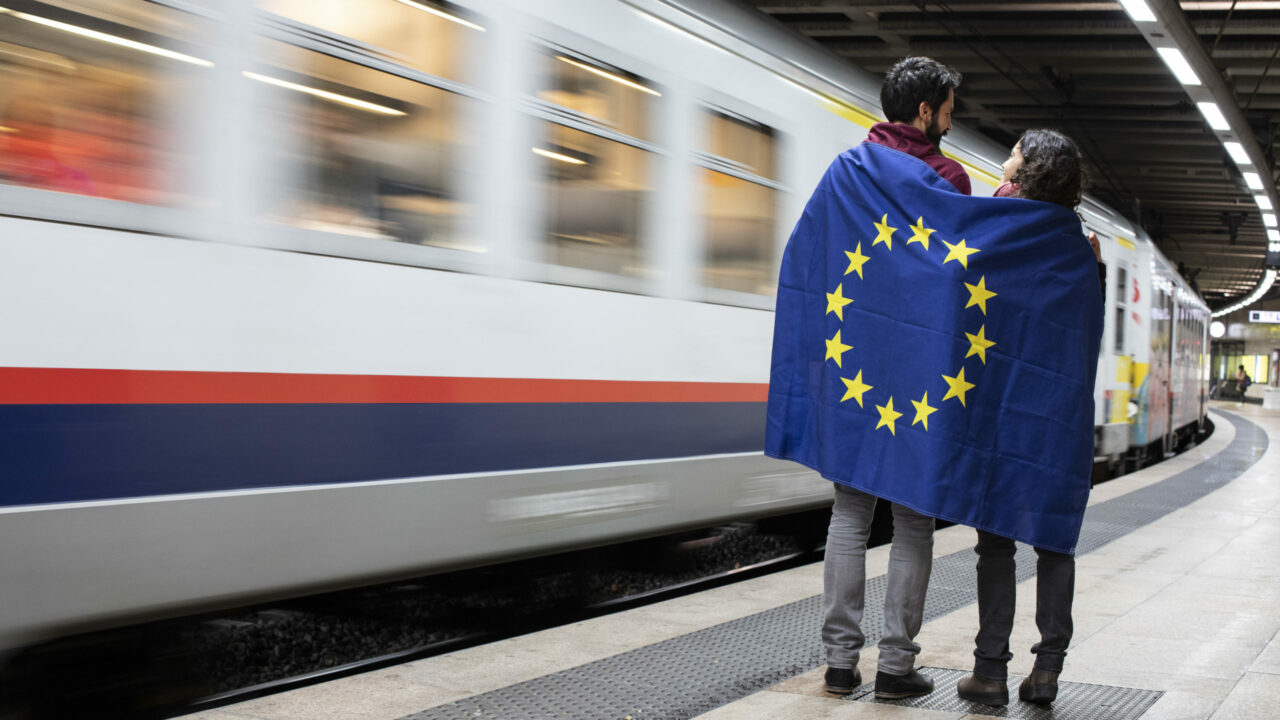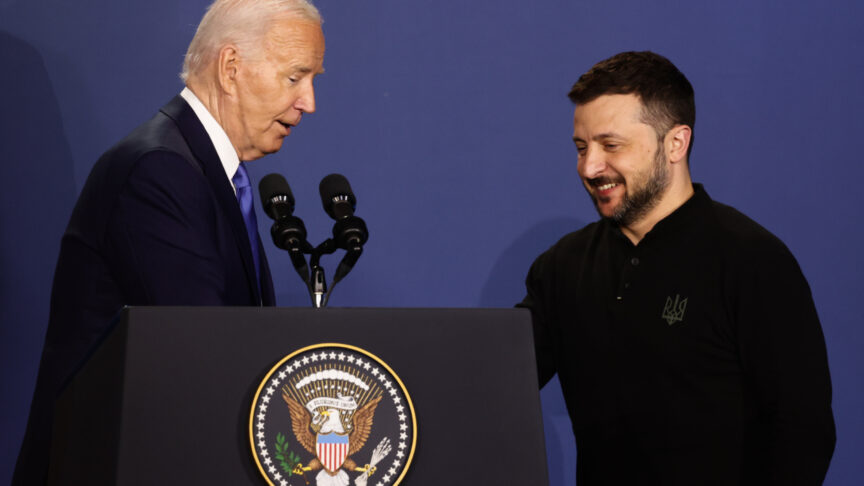From Brussels with love: How the European Union can win the battle of narratives
The EU has a good story to tell. To tell it better, its leaders need to learn from Joe Biden and take a risk on showing themselves to be vulnerable human beings
A compelling political narrative is imperative for the survival of the European Union. Populists chip away at the foundations of liberal democracy while foreign powers actively interfere in Europe’s domestic affairs using “alternative facts” to breed fear and undermine social cohesion. In the words of Josep Borrell, the European Union’s foreign policy chief, winning this “battle of narratives” will be decisive in determining the future world (dis)order.
The covid-19 pandemic adds new urgency to Europe’s quest for a compelling narrative. It has become a turf in the battle of narratives itself. Both China and Russia have stepped up their interference in Europe and its neighbourhood to attempt to portray the EU – and democratic systems more generally – as too weak and to slow to contain the pandemic. These efforts fall on fertile ground as the financial crisis, the political controversies sparked by large-scale migration, and the covid-19 pandemic have shaken the core of public confidence: Europeans fear for their money, their identity, and now their lives. A European narrative needs to address this deeply felt unease and offer reassurance to its citizens. With a new US president-elect keen to rebuild ties across the Atlantic, the EU has now also gained momentum to push back against authoritarian forces and project itself as a powerful global player and potent ally in the global war of words.
By cooperating in the EU, member states can ‘make globalisation safe again’
And yet the EU is seen as notoriously bad at projecting a positive self-image: it is, so the story goes, too out of touch, too technocratic, or simply too dull. In a rapidly changing world, calls for a “new narrative” for the EU are rife. But in defining such a narrative, the EU need not start from scratch. Most Europeans believe that cooperation at EU level is essential to emerge from the crisis, and the union’s political priorities also reflect those of its citizens: with its European Green Deal, the EU has positioned itself in the vanguard of fighting climate change, which is a top concern for European citizens. It has also expanded its social dimension, for example by advocating a mandatory minimum wage, which is supported by 84 per cent of EU citizens according to a poll by the Europe’s Stories project at Oxford University.
In the international realm, the EU has deepened its cooperation on defence, pushed back against Russian aggression in Ukraine, and adopted a tougher stance on China. It has also learnt to leverage its economic might and regulatory powers to take on monopolies in big tech and beyond. And, while they were initially maligned for their lack of solidarity in responding to the covid-19 pandemic, EU member states showed their capacity to course-correct by agreeing a stimulus package of €750 billion to fight the economic fallout from the crisis.
For all its shortcomings, the EU does have a good story to tell. Climate change and the covid-19 pandemic have demonstrated that, however much populists would like to wish it away, interdependence remains a central feature of the international system. By cooperating in the EU, member states can ‘make globalisation safe again’, defining higher standards for the environment, food safety, and public health rather than joining a global race to the bottom. Focusing on green and sustainable growth in the EU’s covid-19 stimulus package allows the EU to shift its narrative from working to overcome the past towards empowering a new generation to jointly confront the future.
Since EU leaders are routinely under attack from Eurosceptics, it is unsurprising they are wary of baring their souls
In a world where the fault-lines between foreign and domestic policy have become increasingly blurred, the EU with its economic might and regulatory powers has a particular strategic fit for tackling some of the world’s most pressing challenges. This allows it to weave a compelling narrative by combining the familiar, but somewhat defensive, trope of a “Europe that protects” with that of a Europe that looks outward and to the future.
The problems the EU faces in making its voice heard, therefore, may be less about what kind of story it tells, and more about how it tells the story.
Identity politics and new technologies put the spotlight on more emotive political communication. Populists exploit this to their advantage, channelling anxiety about political and social change into fear, hatred, and exclusion. At the same time, whether on migration, the euro, or Brexit, the EU has largely communicated with a focus on rationality and economic benefits, even as these are all issues that directly touch on questions of identity and community and therefore also have a strong emotional dimension. This overly rational style of communication hampers its global appeal and stands in the way of a deeper connection with European citizens.
To be sure, information based on facts and scientific evidence needs to be the cornerstone of any sound narrative. But good communication is not merely about putting the facts out there. It is about constructing a compelling argument that appeals to both reason and emotion.
In fact, scientific research has long demonstrated the limits of rational choice in decision-making. As early as 1975, a now-famous experiment at Stanford University showed how presenting scientific evidence has shockingly little effect in swaying people’s minds once they have formed an opinion. More recently, health experts Sara and Jack Gordon have revealed how individuals resist scientific evidence that clashes with their personal views, even when their lives are at stake. Facts alone are simply not enough.
The state of the union address by European Commission president Ursula von der Leyen is a case in point. It was directed at the public’s top priorities, from a greener, more social Europe to a union willing to stand its ground on the world stage. Still, as a trained medical doctor, a mother, and a citizen well versed in several European languages, the president had the potential to connect more immediately to a much wider audience by showing glimpses of the person behind the politician.
Since EU leaders are routinely under attack from Eurosceptics as well as national leaders keen to blame political failures on ‘Brussels’, it is unsurprising that they are wary of baring their souls and prefer to stick to ‘hard facts’. And yet, it is precisely this reluctance to take risks and appear vulnerable that is proving to be the union’s real weakness.
Too often communication remains an afterthought rather than an essential pillar of the political process. A compelling narrative, however, matters not just to ‘sell’ political decisions. It is crucial in building public support for difficult political decisions. This is especially relevant now, as deep transformations in economic and social life may be necessary to help Europeans adapt to a rapidly changing world. The covid-19 pandemic shows that, while populists may have powerful messages, they rarely have effective policy solutions. Countries that denied the seriousness of the virus, such as Brazil or the United States, in an effort to appear ‘strong’, fared much worse in containing its spread than those that reached out to citizens with empathy and honesty such as New Zealand, Germany, and South Korea. Successful political leadership depends on the ability to combine effective policy with a narrative that is both authentic and compassionate.
The recent US election is a good example. Faced with one of the most visceral political battles in living memory, US president-elect Joe Biden chose to embrace his vulnerabilities and turn them to his advantage: his stutter became his “superpower”, projecting humanity; the tragedy of losing his son, a way to connect to a nation roiled by fear and grief in the midst of a pandemic.
Too often communication remains an afterthought rather than an essential pillar of the political process.
In a deeply divided and tumultuous world, channelling people’s need for reassurance cannot remain an afterthought. It is a geopolitical imperative. Connecting to people’s grievances can help inoculate them against hate speech and build trust in political leaders and the institutions they speak for. To do so, the EU should make communication a central aspect of its policymaking process, translate policy into relatable messages, and broaden both the scale and tools with which it engages the public. This is turn will help it project a more credible image abroad.
The current political mood suggests that communicating with more empathy will fall on fertile ground. The outpouring of solidarity with Black Lives Matter, the commitment to fighting climate change, and widespread support for a minimum wage show that Europe’s public mood is not dominated by fear and hatred alone. People also long for fairness, solidarity, and trust. Just as the old adage has it that the personal is always political, the political will need to become more personal if Europe wants to hold its ground in the battle of narratives.
Dr. Julia De Clerck-Sachsse is a Council Member of ECFR and former adviser to EU High Representatives Lady Catherine Ashton and Federica Mogherini. This article first appeared in Internationale Politik. It is based on research Dr. De Clerck-Sachsse is leading at Oxford University.
The European Council on Foreign Relations does not take collective positions. ECFR publications only represent the views of their individual authors.



